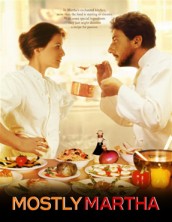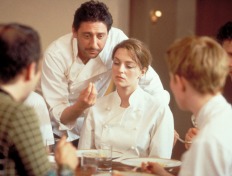|
Mostly Martha
aka Drei Sterne, aka Bella Martha
|
| |
 |
German language. Germany/Italy/Austria/Switzerland,
2001. Rated PG. 107 minutes.
Cast:
Martina Gedeck, Sergio Castellitto, Maxime Foerste, Ulrich Thomsen, August
Zirner, Sibylle Canonica, Katja Studt, Idil Ürer, Oliver Broumis, Antonio
Wannek, Diego Ribon
Writer: Sandra Nettelbeck
Music: David Darling, Keith Jarrett, Arvo Pärt (with songs by Dean
Martin, Paole Conte, Louis Prima, et al.)
Cinematographer: Michael Bertl
Producers: Karl Baumgarter, Christoph Friedel
Director: Sandra Nettelbeck
LINKS
|
Read Carlo's
interview with Sandra Nettlebeck.
 ausages
and schnitzels, bratwurst and beer--that's what German food brings to mind.
Consider a German movie about food, and you might think of a bunch of
overweight middle-aged guys at a sports bar, choking on their sausages and having
heart attacks while hailing the achievements of Mike Ditka and Da Bearsss. You
don't think of delicate haute cuisine. You don't think of the kind of food in
Mostly Martha, a refined, graceful drama from writer/director Sandra
Nettelbeck.
ausages
and schnitzels, bratwurst and beer--that's what German food brings to mind.
Consider a German movie about food, and you might think of a bunch of
overweight middle-aged guys at a sports bar, choking on their sausages and having
heart attacks while hailing the achievements of Mike Ditka and Da Bearsss. You
don't think of delicate haute cuisine. You don't think of the kind of food in
Mostly Martha, a refined, graceful drama from writer/director Sandra
Nettelbeck.
Nominated for "Outstanding Feature Film" at the 2002 German Film Awards, Mostly
Martha isn't quite the loving ode to gastronomy that is Big Night,
but it's not far off. Everything in Mostly Martha is centered around
food, particularly beautiful Martha (Martina Gedeck) herself. Food fills Martha's
life, allowing room for nothing else--no friends, no hobbies, and no Other--Significant
or otherwise. She is the renowned, totalitarian head chef at a ritzy restaurant.
Any philistine customers who accuse her perfectly baked foie gras of
being undercooked do so at their own risk.
Martha copes with all situations through food. When a new resident (Ulrich
Thomsen) moves into her building, she offers him food. When talking to a therapist
(August Zirner), she describes recipes and brings him an entire multicourse
gourmet meal in Tupperware containers to avoid saying anything substantive.
 When
her sister (writer/director Sandra Nettelbeck) passes away, leaving her eight-year-old
daughter Lina (Maxime Foerste) in Martha's care, Martha tries to assuage the
girl's grief by repeatedly offering her food. The fact that Lina won't eat is
bewildering to Martha. She has no idea what to do.
When
her sister (writer/director Sandra Nettelbeck) passes away, leaving her eight-year-old
daughter Lina (Maxime Foerste) in Martha's care, Martha tries to assuage the
girl's grief by repeatedly offering her food. The fact that Lina won't eat is
bewildering to Martha. She has no idea what to do.
Equally bewildering is the arrival of sous-chef Mario (Sergio Castellitto)
in Martha's spotless kitchen. Immune to his Mediterranean charms, Martha immediately
assumes he has designs on her job. Lina responds more positively to Mario, perhaps
because the absentee father she longs for, Giuseppe, is also Italian. Martha
is losing control, and losing control is the one thing she cannot abide. When
her stress builds, she flees to the kitchen's freezer to cool down--literally.
The rest of the film proceeds along expected lines, much as an American romantic
comedy would. Mostly Martha isn't a comedy, however, but a patiently
paced character study and a measured drama about a woman who learns that a little
loss of control isn't a bad thing. Though the plot is predictable, the movie
never feels formulaic, because the attention is on the nuances of the emotional
development of the delicate characters.
A large portion of the credit for the film's effectiveness must go to the three
principal actors, Gedeck, Castellitto, and Foerste. Especially adept is Gedeck,
as the film rests on her controlled performance that shifts almost subliminally
with the changes in Martha. Gedeck's acting is invisible. Her Best Actress prize
at the 2002 German Film Awards was well earned. Foerste, whose role is just
as difficult, may be a child playing a child, but there is nothing childlike
about her acting. Castellitto, whose role is a bit easier, fools around with
Italian stereotypes in his hammy entrance, cementing Martha's negative first
impression. He tones things down almost immediately. Castellitto, who spoke
his lines in Italian and was dubbed, had to overcome a language barrier in working
with the rest of the cast and crew, but his expressive performance shows that
he had no need to understand his colleagues' words in order to listen and communicate.
Mostly Martha ends in the only way it can, and rather abruptly, too.
Much of the resolution is sprinkled over the end credits. It's as if Nettelbeck,
cognizant that she is following a standard recipe in order to bring the film
to a close, doesn't want to give it more than a perfunctory amount of screen
time. That's fine, because we all know where the film is going. The pleasure
lies in consuming the repast, not in cleaning up afterward.
Review
© August 2002 by AboutFilm.Com and the author.
Images © 2001 Paramount Classics. All Rights Reserved.

 When
her sister (writer/director Sandra Nettelbeck) passes away, leaving her eight-year-old
daughter Lina (Maxime Foerste) in Martha's care, Martha tries to assuage the
girl's grief by repeatedly offering her food. The fact that Lina won't eat is
bewildering to Martha. She has no idea what to do.
When
her sister (writer/director Sandra Nettelbeck) passes away, leaving her eight-year-old
daughter Lina (Maxime Foerste) in Martha's care, Martha tries to assuage the
girl's grief by repeatedly offering her food. The fact that Lina won't eat is
bewildering to Martha. She has no idea what to do.
